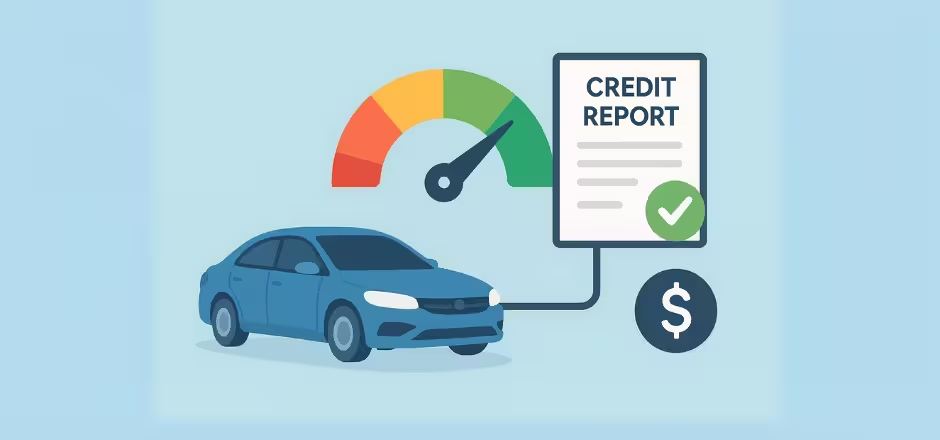If the financing option is to be pursued when buying a car, your credit score significantly determines whether or not you qualify for a car loan and the rate of interest you may be charged. Necessary knowledge should be possessed, therefore, by buyers entering into a purchase for the first time and those who are trying to reclaim their credit status, regarding the way the credit score affects car loan applications. This guide will answer the most prevailing queries regarding how much credit score is required for a car loan, its importance, how to check your score, tips on improving your score, and the requirements in Canada. A quick FAQ session will wrap things up.
Why Credit Score Matters for Car Loans
Your credit score for car loan applications is a three-digit number that gives lenders an idea of how risky it is to lend you money. When applying for a car loan, your credit score helps determine:
- Whether you are eligible
- Charging the interest rates is
- Another requirement of a down payment
- Offering a loan tenure and a borrowing limit
Most car loan lenders in Canada and worldwide depend on Equifax or TransUnion scores in the range of 300-900. Here’s what the different ranges mean for obtaining car loans:
Credit Score Range & Car Loan Outcome
760–900 (Excellent Credit)
- Credit Quality: Excellent
- Likely Outcome: With little effort, approval shall be given
- Benefit: Using this credit score means paying the lowest interest rate.
700–759 (Good Credit)
- Credit Quality: Good
- Likely Outcome: Quick approval
- Benefit: Implying that she or he will get rates that are competitive
650–699 (Fair Credit)
- Credit Quality: Fair
- Likely Outcome: Likely to be approved
- Effect: May face higher rates
600–649 (Poor Credit)
- Credit Quality: Poor
- Likely Outcome: Possible approval, but with very far fewer choices
- Condition: With higher interest rates, a Larger down payment may be required or the assistance of a co-signer
Below 600 (Very Poor Credit)
- Credit Quality: Very Poor
- Likely Outcome: Hard to get approved with traditional lenders
- Condition: Subprime with sky-high interest rates
A higher credit score for car loan means it will be easier for you to get approved for a car loan at better terms.
How to Check Your Credit Score Before Applying
Before applying, it’s smart to check your credit score needed for car loan eligibility. This lets you decide whether to apply now or wait and improve your score.
Here are some safe and easy ways for you to check your score in Canada:
1. FREE Credit Score Apps
Use any of the services below:
- Borrowell
- Credit Karma Canada
- Mogo
All of these platforms provide it free of cost to check your credit score, and a soft check does not influence your credit.
2. Via Credit Bureaus
You can also request credit reports directly from:
- Equifax Canada (www.consumer.equifax.ca)
- TransUnion Canada (www.transunion.ca)
They give both free and paid versions of a credit report.
3. Through Your Bank or Credit Union
Some Canadian banks and credit unions (RBC, BMO, CIBC, etc.) allow you free access to your credit via online banking.
Tip: Check your credit report and credit score before applying. Your report lists exact borrowing history, which car loan lenders will also consider.
Tips to Improve Your Credit Score Before Applying
If your score is below 650, you may struggle to qualify or face high-interest rates. Here’s how to boost your credit score for car loan approval:
1. Paying Bills on Time
Payment history factors into 35% of your credit score. Set a reminder or automate payments so you can also do away with late fees.
2. Paying Down Credit Card Balances
Ensure you have a credit utilization of less than 30% of your credit limit. Say you have a credit limit of $5000, do not try carrying a balance of more than $1500.
3. Quit Applying for Too Much Credit All at Once
Each application leads to a hard inquiry and virtually causes your score to be lowered. Too many hard checks within a narrow timeline may severely dent your credit profile.
4. Look Out for Errors on Your Credit Report
Items that are incorrectly shown, like unpaid accounts or duplicate records, can bring down your score. Dispute the errors with either Equifax or TransUnion.
5. Keep Old Credit Cards
The length of credit history matters. Never close old accounts unless necessary.
6. Get a Secured Credit Card
When your score is low, a secured credit card, where you deposit money as collateral, can help you build credit responsibly.
Imagine improving your score by just 50 to 100 points—you will see spectacular results on car loan interest rate reductions and the savings in thousands over the life of the loan.
How Much Credit Score Is Required for Car Loan in Canada?
In Canada, the minimum credit score for car loan Canada approval through a traditional lender is typically 650. However, this varies depending on the lender type:
1. Prime Lenders (Banks, Credit Unions):
- Typically lend to credit scores of 650 and above
- Lowest rates of interest
- Verification of income must be convincing
2. Non-Prime/Subprime Lenders (Alternative lenders):
- Accept scores as low as 500
- The interest may lie between 10% and 29%
- Require large down payments or co-signations
3. Buy Here Pay Here:
- No credit score minimums
- Highest interest rates
- Payments are then made directly to the dealership
Credit Score Benchmarks in Canada:
1. Bank Car Loan
- Ideal Credit Score: 700+
- Possible with Low Credit? No
2. Credit Union Loan
- Ideal Credit Score: 650+
- Possible with Low Credit? Sometimes
3. Subprime Car Loan
- Ideal Credit Score: 500+
- Possible with Low Credit? Yes, though with very high-interest rates
4. No Credit History Loan
- Ideal Credit Score: N/A
- Possible with Low Credit? Yes, but the requirements for a co-signer or collateral have to be met.
It is often wise to wait for improvement in credit scores or to consider other options, such as loans from a co-signer or a higher down payment, if your credit score is below 600.
Frequently Asked Questions (FAQs)
1. What’s the minimum acceptable credit score for an auto loan in Canada?
Usually, most conventional sources will accept a 650 credit score as the minimum score to be regarded. Some subprime lenders would lend to you down to even 500, but higher rates would be imposed.
2. Can I get a car loan with bad credit?
Yes, but you may have to:
- Go through a subprime lender
- Put more money down
- Get a co-signer
- Accept a higher rate of interest
3. How does the credit score affect the interest rate on my car loan?
Interest rate goes down with higher credit scores. For example:
- 750+ Credit score: 3%-5% interest
- 600-649 Credit score: 8%-14% interest
- Below 600 credit score: 15%-29% interest
4. How does checking my credit score affect it?
Unlike a hard inquiry, a soft check is done by a service such as Borrowell or Credit Karma, and it does not affect your score.
5. How can I increase my chances of getting a car loan with poor credit?
- Co-sign with somebody who has good credit
- Make a large down payment
- Select a cheaper vehicle
- Lend through credit unions or subprime lenders
6. Does getting a car loan depend solely on my credit score?
No. Apart from your credit score, lenders will also look at:
- Your income
- Your debt-to-income ratio
- Your employment history
- Your down payment
Ready to apply for a car loan? Check your credit score, compare lenders, and take the next step toward owning your dream vehicle with confidence! For any query, contact NewsMagToday.



